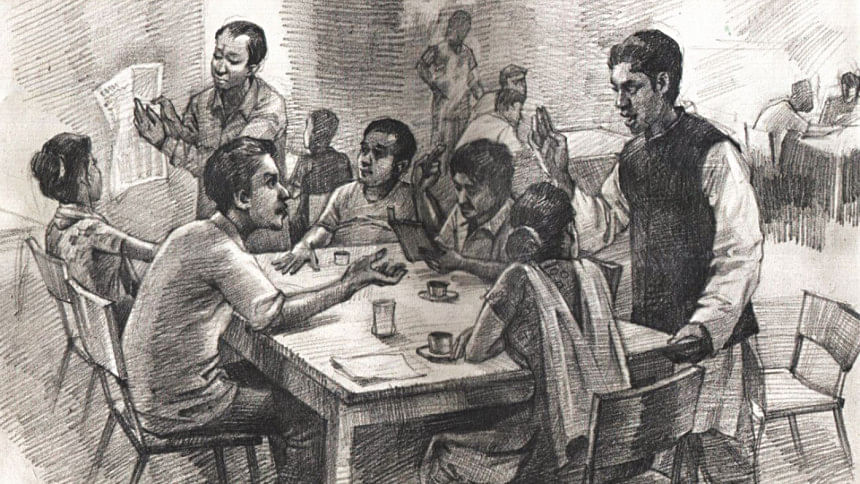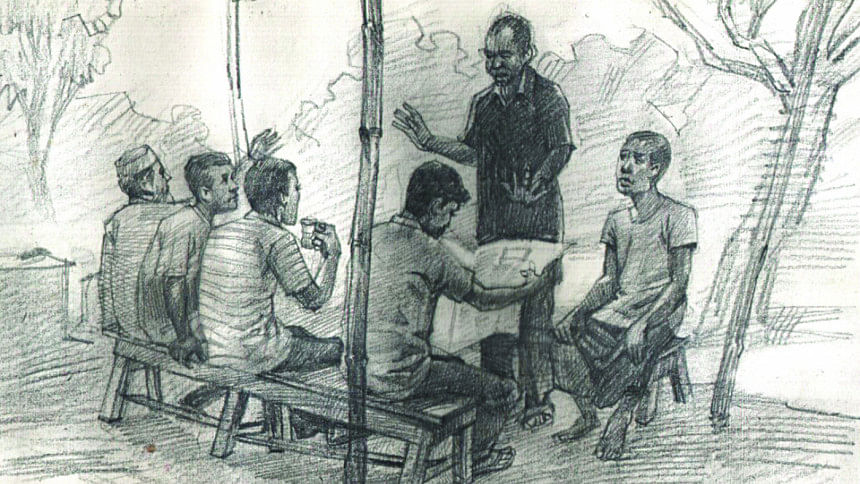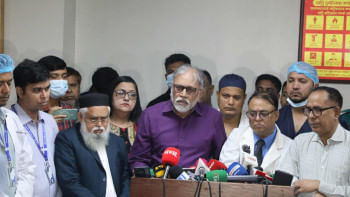The melting pot

A tribute to Madhur Canteen Of tea and politics
Madhur Canteen has been a witness - and an active participant - of the numerous uprisings and revolutions that has dotted the history of our country. Leaders such as Bangabandhu Sheikh Mujibur Rahman were regulars in Madhur Canteen. From the Language Movement to the mass uprising of 1969, and from the revolution against the Ershad-led dictatorial regime to current times, the canteen continues to serve as a political hub.
THE POLITICAL LANDMARK
Mujahidul Islam Selim was a student of Dhaka University back in the '60s. An economics student living in Mohsin Hall, he remembers having his breakfast at Madhur Canteen. But more so, given that he was a student politician, it was natural that he made frequent visits to the historic cafeteria. "The place was not just a platform for the students of Dhaka University, but a political hub for the entire student community," he said.
"Debating was a common activity that took place in the cafeteria, and I had my share of it too. Sometimes, hundreds of people would crowd around a table and listen to the speakers," informed Selim, who is a former Vice President of Dhaka University Central Students' Union (DUCSU) and now a veteran political leader as the President of Communist Party of Bangladesh.

A tribute to Madhur Canteen remains incomplete without mentioning its founder, Madhu Sudan Dey. "Sometimes, we used to hand over money to him, to be given to someone perhaps later in the evening. And sometimes, when we fell short of cash, we borrowed it from him," he explained. "He was extremely accommodative and helped in us in every possible way."
After the rebellious 1960s came the all-out Liberation War. The beloved 'Madhu da', not spared of the atrocity, had lost his life.
UNITED WE STAND
With the nation under the dictatorship of Hussain Muhammad Ershad, Bangladesh in the '80s went through immense political turmoil. For a people that hold democracy as one of its core values, autocracy was not to be accepted by any means.
During those turbulent times, Zayadul Ahsan Pintu was a Mass Communication & Journalism student at Dhaka University. He had already started his career in journalism by then. He was also affiliated to Bangladesh Chhatra League, the student wing of Bangladesh Awami League.
At that point, there was only one goal in mind: to topple the dictatorial government. The students played a pivotal role in the revolution and the student organisations worked unitedly, with the promise of bringing an end to Ershad's regime.
Madhur Canteen was the melting pot. "It was where all the student politicians sat under one roof. So, the cafe essentially served as the common platform for different student bodies," said Pintu, who is now the Chief News Editor, News & Current Affairs, Desh TV.
"Madhur Canteen taught us mutual respect. It was where student leaders greeted and talked to each other and exchanged viewpoints. It was where a student leader used to be welcomed not just by his league's members, but those from other organisations as well," he informed.
From the morning to somewhere around afternoon, the canteen was kept busy with students discussing strategies, brainstorming campaign ideas, devising poster designs and slogans.
Pintu recalls those days and believes that unity among the student organisations was a key factor behind the success of the revolution.
MADHUR CANTEEN TODAY
The spirit of the great national leaders like Bangabandhu looms over Madhur Canteen till today. And, just as it always had been, the tables of the canteen are occupied by students of this generation. Lucky Akter, President of Chhatra Union's central committee and an avid Gonojagaran Mancha activist, is one of them. She says that in the February of 2013, when International Crimes Tribunal sentenced life imprisonment (instead of the more deserving capital punishment) to the war criminal Abdul Quader Mollah, angry and disappointed students rushed out of Madhur Canteen for a procession, making it the first rally in protesting the court's decision. Indeed, for ages, the cafeteria has been a popular starting point of processions.
From passionate debates to the never-ending discussions, the place continues to be the centre stage of student politics.
The legacy of Madhur Canteen lives on.
In many tea stalls and cafes of our country, we notice a very common poster. Often written in big and bold font – and then signed by the 'authority' – are the words, 'Ekhane rajnoitik alap kora nishhed': political discussion is prohibited here.
It's one of those things that make you smirk and feel curious at the same time. When you come across such a notice, perhaps you reckon that the 'rule' had been put in place after the owner saw a group of young students fanatically arguing about politics over a cup of tea, when things got a little out of hand. Or perhaps, the shrewd owner, from bitter experience, understood that a political discussion runs for an infinite period of time, and that it might pay him better if a table is not occupied by one group for hours.
Let's not dwell further into the workings of the owner's mind. You now understand the context: people are passionate about politics and love the political 'adda'.
There are two things that get a Bangladeshi's blood pumping: cricket and politics. We are fervent about our team doing well in sports, in beating every other country's team and securing national pride. And, we are equally obsessed with politics.
Cricket and politics are our two most favourite topics of discussion. It doesn't matter much what the time of day – or night – it is irrelevant whether the people you are discussing politics with are your parents, friends, colleagues, classmates or even sheer strangers! Be it in the roadside 'tong' or your office canteen or your balcony, they are all hotbeds of 'adda'. Give us 'cha' and 'shingara' and a company of people, and politics takes over.
Politics takes over. People of different ages. People from all walks of life. People of different ages and walks of life together in one group. It doesn't matter. Talking about politics is our favourite pastime.
And what do we talk about, in politics? Opinions and ideas fly about. Some very impressive. Some, rather dumb. But who's to decide? The other party of course! And hence starts the debate.
What do we debate about, in politics? Topics fly about. Running a village or a city or a country or the entire world, for that matter, is no easy business. Great minds have given theories and practices and philosophies – some more radical than others. Based on a lot of factors, many people tend to lean towards a particular ideology. And he is passionate about it, just like the person sitting next to him. Only that the other guy perhaps adheres to a different school of thought. And hence the debatestarts.
And based on the ideology and many other things, a person sometimes picks his favourite 'team', a political party he roots for. And he is passionate about it, just like the person sitting next to him. Only that the other guy perhaps adheres to a different school of thought. And hence the debate starts.
What is it that makes politics an interesting topic of discussion? Perhaps, one reason is that we are a patriotic lot, and that many among us are very opinionated. It has not developed in a day. Years of political oppression, and the war, and the revolutions, and the turmoil and unrest, and the rich political history of our nation - has all dug deep into our psyche.
It's all good. But then, sometimes, things get a little out of hand. Debates turn into heated arguments. That's when the café or tea stall owner steps up.
Who wins these arguments anyway?
Sketch by Didarul Islam Lemon

 For all latest news, follow The Daily Star's Google News channel.
For all latest news, follow The Daily Star's Google News channel. 



Comments